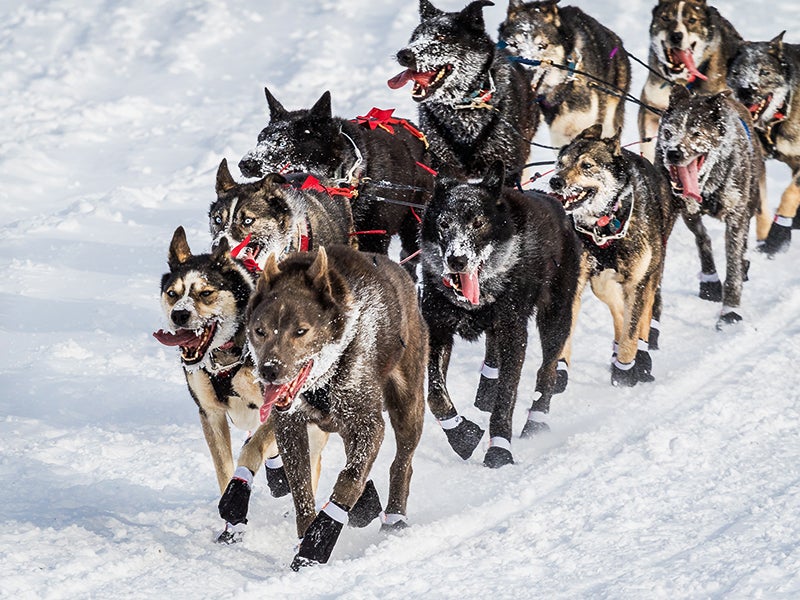Free Speech in the Land of the Midnight Sun
A new rule in the Iditarod Trail Sled Dog Race stifles opposition to a massive open-pit gold mine in southwestern Alaska.

This page was published 9 years ago. Find the latest on Earthjustice’s work.
Every year, the Iditarod Trail Sled Dog Race brings people together to cheer on mushers and their dog teams as they complete the arduous, 1,000-mile journey from Anchorage to Nome. The 2016 race roster includes entrants from Alaska, the lower 48 states, Canada, the UK, Norway and Sweden, and their styles and viewpoints are about as eclectic as they are. Mushers have different approaches to training and feeding their dogs, some run during the day and others at night, and one flies a flag opposing the Pebble Mine, an expansive project that would harm salmon in Bristol Bay.
This year, though, a new rule prohibits mushers from making public statements deemed “injurious to” the race, including comments “disparaging to any of the sponsors.” The source of the new restriction is unknown, but some have suggested Donlin Gold, a mining company that is currently seeking permits for a massive pit mine in southwestern Alaska and is a major sponsor of the race. The company has good reason to throw cash at Iditarod fans and participants: its proposed 315-mile-long, buried natural gas pipeline leading to the mine would be in the vicinity of the Iditarod National Historic Trail for nearly 60 miles, crossing it 13 times.
For those who will not be bought, the new gag rule may do the trick. It’s worth noting that the general manager of Donlin Gold is on the Iditarod Trail Committee’s Board of Directors, and that the board’s executive committee decides on the punishment for an “injurious” statement. A musher who speaks out can be forced to withdraw, disqualified after finishing, or barred from competing in future events.
Though the punishments for this year’s entrants would be severe, the new rule can’t silence those who participated in past races. Dan Seavey, who competed in the inaugural race in 1973 and served on the race’s board of directors for nine years, recently wrote an editorial raising legitimate concerns about the natural gas pipeline. The Iditarod Trail Committee’s directors swiftly responded by attacking Seavey’s credibility and reassuring readers that the pipeline would not, in fact, affect the trail.
Why is Donlin Gold apparently so intent on controlling public dialogue about the mine? The answer may lie in the mine’s serious consequences for local communities and the environment.
Aside from the pipeline, potential impacts of the gold mine include a 2-square-mile, 1,000-foot-deep lake that will form as water fills the mine pit after it closes. The water will have to be treated in perpetuity. Plus, a 2,351-acre storage facility will hold up to 568 million tons of mining waste behind a dam. As recent experience shows, a dam failure would be devastating for local communities and traditional ways of life along the Kuskokwim River.
The mine project will also require 122 round-trip barge journeys on the Kuskokwim River from June through September every year. Barges will carry up to 300,000 gallons of diesel fuel. A spill could harm birds in the Yukon Delta National Wildlife Refuge and interfere with subsistence salmon fishing, an important source of food for local residents.
Perhaps most alarming, the mine will emit almost 1.6 million metric tons of CO2-equivalent each year. That represents a significant contribution to statewide greenhouse gas emissions, and is substantially more than other mines emit. Alaskans have seen firsthand the dramatic effects of climate change, which are already displacing people from their homes and depriving them of their livelihoods. (Global warming affects the Iditarod, too: snow had to be brought in by rail for the ceremonial start of the race in Anchorage, and in recent years the official start has moved farther north to better conditions.)
With dangers on this scale, it’s no wonder the mine’s proponents would want to clamp down on the opposition.
Still, a restriction on speech feels wrong. Freedom of expression is a value we all treasure as Americans, partly because we know it is essential to our democracy. The First Amendment to the Constitution protects us from censorship by the government, but private entities like the Iditarod Trail Committee can make the rules for their own events and shield their sponsors from high-profile public debate. Though mushers—like Alaskans generally—are independent, self-reliant, and usually willing to voice their opinions, this year some have kept silent for fear of disqualification. If the rule stays in place, entrants will have to censor themselves for most of the calendar year.
A rule that chills free speech doesn’t make for a better race. Instead, it discourages discussions about one sponsor’s activities at a time when public input is crucial. The comment period on the environmental impact statement for the Donlin gold mine runs through April 30, 2016. While mushers may not be able to express their opposition to the project publicly, you can submit comments directly to the U.S. Army Corps of Engineers. We hope you will—for the sake of the Iditarod, Alaska and our planet.
Opened in 1978, our Alaska regional office works to safeguard public lands, waters, and wildlife from destructive oil and gas drilling, mining, and logging, and to protect the region's marine and coastal ecosystems.